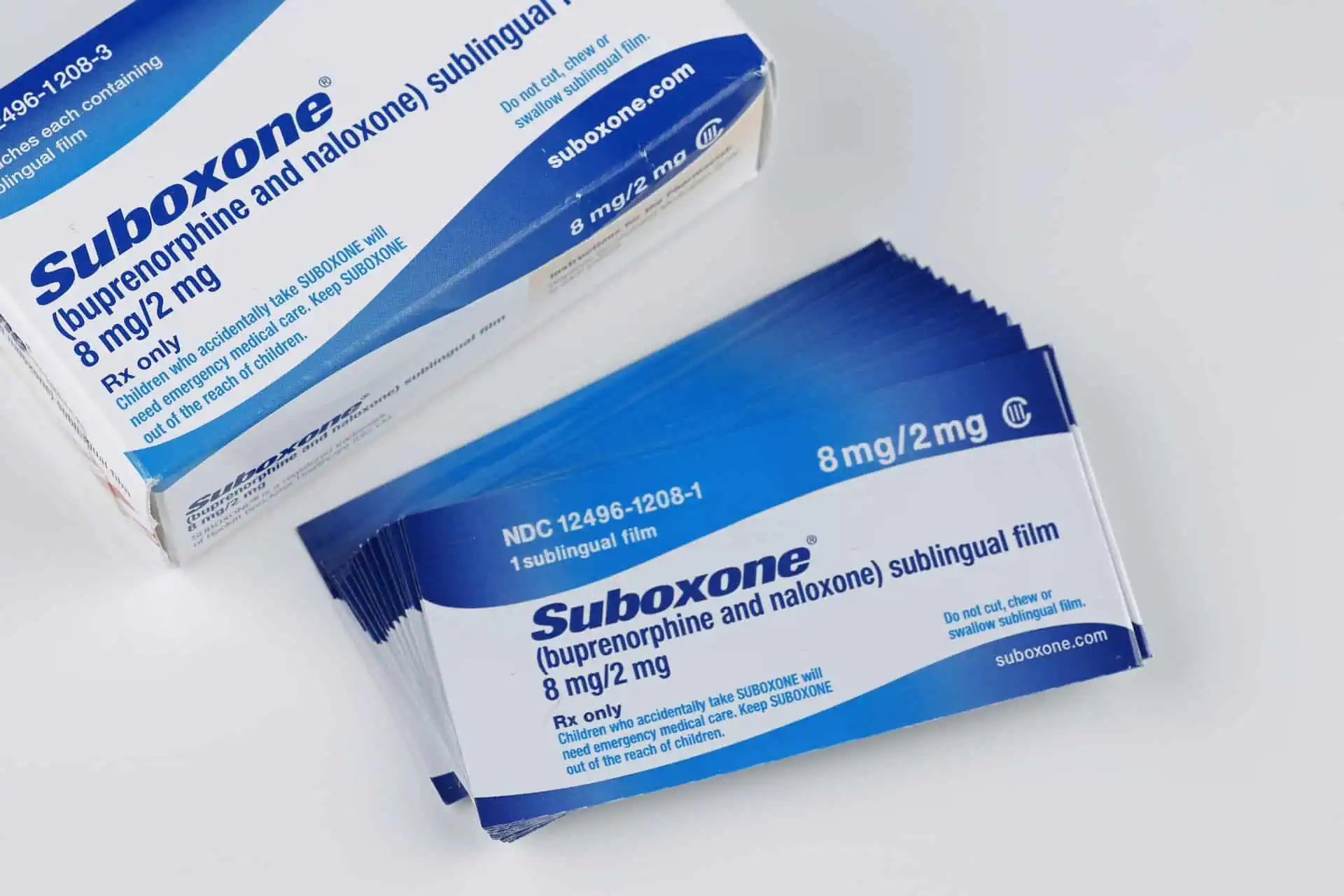Suboxone Teeth Lawsuit Payout Per Person
- Last Updated: June 12th, 2025

Attorney Jessica Paluch-Hoerman, founder of TruLaw, has over 28 years of experience as a personal injury and mass tort attorney, and previously worked as an international tax attorney at Deloitte. Jessie collaborates with attorneys nationwide — enabling her to share reliable, up-to-date legal information with our readers.
Legally Reviewed
This article has been written and reviewed for legal accuracy and clarity by the team of writers and legal experts at TruLaw and is as accurate as possible. This content should not be taken as legal advice from an attorney. If you would like to learn more about our owner and experienced injury lawyer, Jessie Paluch, you can do so here.
Fact-Checked
TruLaw does everything possible to make sure the information in this article is up to date and accurate. If you need specific legal advice about your case, contact us by using the chat on the bottom of this page. This article should not be taken as advice from an attorney.
Overview of Suboxone Teeth Lawsuit Payout Per Person
On this page, we’ll discuss an overview of the Suboxone teeth lawsuit, health conditions associated with Suboxone sublingual strips, how to file a Suboxone teeth decay lawsuit, and much more.
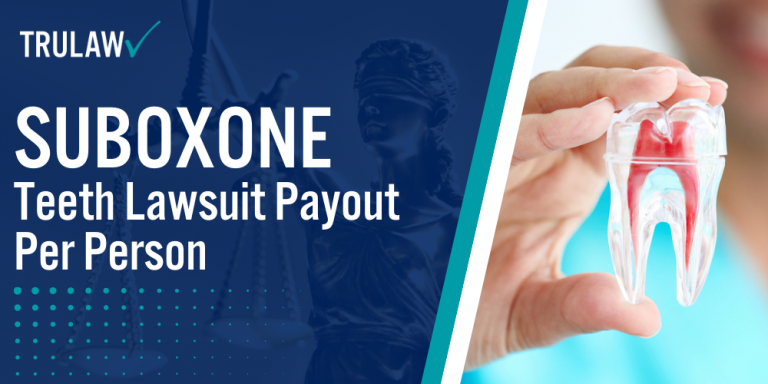
Intro to the Suboxone Teeth Lawsuit
Suboxone is a prescription drug widely used in opioid addiction treatment, is at the center of a potential multi-district litigation to consolidate claims against the manufacturer (Indivior).
The sublingual film form in Suboxone has been associated with severe dental injuries including, but not limited to:
- Gum disease;
- Cavities;
- Tooth decay;
- Tooth loss; and
- other serious dental problems.
If you’ve suffered from oral health issues after being prescribed suboxone, you may qualify to file in the Suboxone Teeth Lawsuit.
Contact TruLaw for a free consultation using the chat on this page to receive an instant case evaluation.
Table of Contents
Overview of the Suboxone Teeth Lawsuit
Suboxone is a prescription drug widely used in opioid addiction treatment, is at the center of a growing legal controversy.
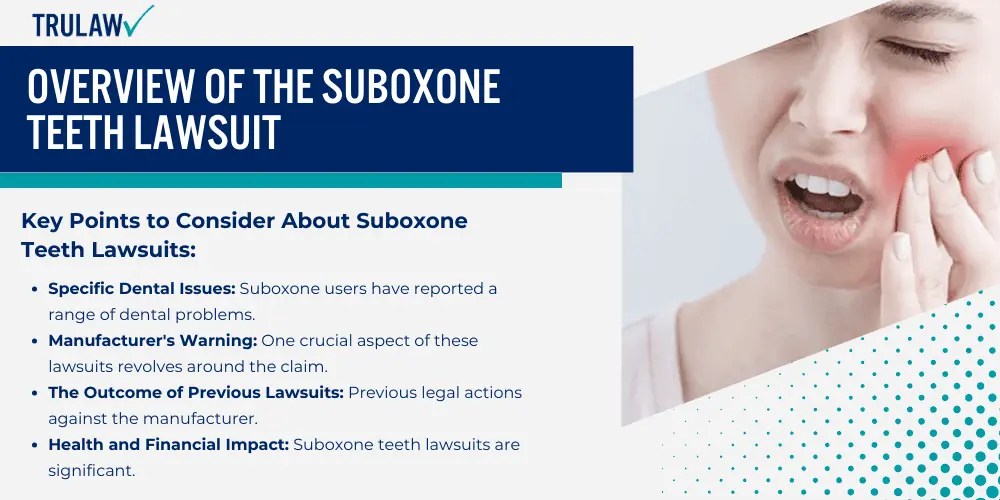
This medication, combining buprenorphine (a partial opioid agonist) and naloxone (an opioid antagonist), is prescribed to treat opioid use disorder and to alleviate withdrawal symptoms.
Why are Suboxone Teeth Lawsuits Being Filed?
The surge in Suboxone tooth decay lawsuits can be attributed to serious concerns surrounding the medication’s adverse dental effects and allegations of inadequate warnings provided by the manufacturer, Indivior.
These legal actions shed light on the dental health issues associated with Suboxone and the potential impact on those who have taken the medication.
Key factors surrounding Suboxone Teeth Lawsuits include, but are not limited to:
- Specific Dental Issues: Suboxone users have reported a range of dental problems, including severe tooth decay, erosion, dry mouth, gum problems, tooth fractures, and infections. These dental issues have led individuals to file Suboxone tooth decay lawsuits, seeking compensation for their suffering.
- Manufacturer’s Warning: One crucial aspect of these lawsuits revolves around the claim that Indivior failed to adequately warn consumers about the potential dental risks associated with Suboxone. Some studies have suggested a link between Suboxone use and dental problems, and the FDA has issued warnings about these risks.
- The outcome of Previous Lawsuits: Previous legal actions against the manufacturer, including class-action lawsuits and product liability cases, have raised awareness about Suboxone’s dental consequences. These precedents have paved the way for more individuals to pursue legal recourse.
- Health and Financial Impact: Suboxone teeth lawsuits are significant because they address not only the physical suffering of affected individuals but also the financial burden associated with dental treatments and oral health maintenance. These lawsuits aim to provide compensation for both medical expenses and the pain endured.
The Suboxone teeth lawsuit serves as a crucial legal matter, spotlighting the adverse effects of the drug and the alleged lack of information provided by the manufacturer.
This litigation has the potential to influence the healthcare industry, patient well-being, and pharmaceutical practices.
The Connection between Suboxone and Tooth Decay
Recent research has drawn a direct line between the use of Suboxone, a medication prescribed to treat opioid addiction, and a significant increase in dental complications, including tooth decay.
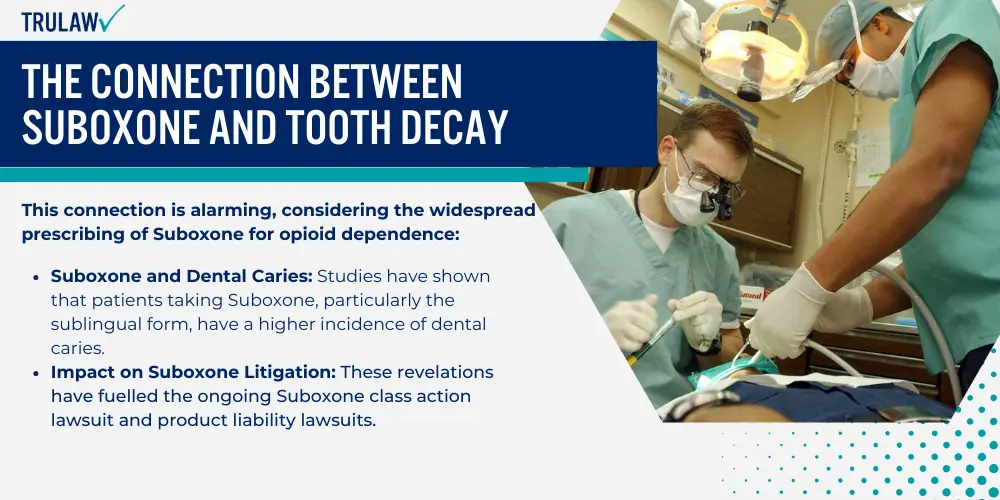
This connection is alarming, considering the widespread prescribing of Suboxone for opioid dependence.
- Suboxone and Dental Caries: Studies have shown that patients taking Suboxone, particularly the sublingual form, have a higher incidence of dental caries. The link seems to stem from the acidic nature of the medication, which, when dissolved in the mouth, can weaken tooth enamel. This weakening makes teeth more susceptible to decay.
- Tooth Erosion and Other Dental Injuries: Beyond cavities, the research points to a broader spectrum of oral health issues. These include tooth erosion, gum disease, and other dental injuries, exacerbated in patients who have been prescribed Suboxone film. These findings are particularly concerning for individuals who have suffered severe tooth decay as a result of long-term use.
- Impact on Suboxone Litigation: These revelations have fuelled the ongoing Suboxone class action lawsuit and product liability lawsuits. Plaintiffs in these cases argue that drug manufacturers failed to adequately warn about these risks, leading to severe dental decay among users.
FDA’s Response to Suboxone Dental Complications
The U.S. Food and Drug Administration (FDA) has been monitoring the situation closely and has taken steps in response to the growing concerns over Suboxone-induced dental issues.
- Labeling and Warning Updates: In response to the mounting evidence and the increasing number of Suboxone tooth decay litigation cases, the FDA has mandated updates to Suboxone’s labeling. These updates are aimed at informing both patients and healthcare providers about the risk of dental decay and other oral health issues associated with the medication.
- Guidance for Healthcare Providers: The FDA has also issued guidance for healthcare providers prescribing Suboxone. This includes recommendations for monitoring oral health in patients taking Suboxone, especially those using the sublingual buprenorphine formulation. The guidance stresses the importance of being vigilant about signs of tooth decay, erosion, and gum disease in these patients.
In-Depth Look at Suboxone Teeth Lawsuits
Suboxone Class Action Lawsuit and Settlement
- The Northern District of Ohio’s Involvement: The Northern District of Ohio has become a focal point in the Suboxone litigation landscape, with multiple Suboxone tooth decay claims being filed in this jurisdiction. The court is overseeing a multitude of cases as part of the multidistrict litigation process.
- Settlements and Resolutions: There have been significant developments in the final Suboxone monopoly lawsuits and other related cases. These include substantial settlements, where drug manufacturers have agreed to pay large sums, addressing claims that they failed to warn about the severe risks associated with Suboxone, including tooth decay and other dental injuries.
Role of Suboxone Tooth Decay Lawyers
- Advocating for Victims: Suboxone tooth decay lawyers play a pivotal role in representing individuals who have suffered severe tooth decay or other dental injuries from taking Suboxone. These attorneys are instrumental in filing Suboxone tooth decay litigation, aiming to hold manufacturers accountable for not disclosing the full extent of the drug’s risks.
- Navigating the Legal Process: For those looking to file a Suboxone teeth lawsuit, these specialized lawyers offer guidance through the complexities of the legal system. They help in demonstrating the link between prescribed Suboxone film and subsequent dental issues, a critical aspect in these cases.
Impact on Patients and Prescribers
- Patients Suffering from Dental Issues: For individuals who have been taking Suboxone, especially the prescription Suboxone film or sublingual films, the risk of dental decay, tooth extractions, and oral infections has become a pressing health concern. These patients often require extensive dental treatments, including dental implants, to address the damage caused.
- Shift in Prescribing Practices: The revelations from these studies and lawsuits have prompted a shift in how physicians prescribe Suboxone. There’s a growing emphasis on assessing the risk of dental decay and considering alternative treatments where possible to minimize the risk of severe tooth decay.
- Broad Implications for Opioid Addiction Treatment: The Suboxone dental lawsuit and subsequent findings have broader implications for the treatment of opioid addiction. They highlight the need for a balanced approach that considers the potential side effects of buprenorphine medications, including the risk of dental decay from sublingual buprenorphine-naloxone exposure.
The connection between Suboxone and tooth decay has significant legal, medical, and societal implications.
It underscores the need for increased awareness among patients and healthcare providers about the potential risks associated with this commonly prescribed medication for opioid dependence.
As the Suboxone litigation continues to unfold, it serves as a stark reminder of the critical need for comprehensive drug safety evaluation and transparent communication from drug manufacturers.
Rise in Suboxone Dental Decay Lawsuits
The recent surge in Suboxone dental decay lawsuits has caught the attention of both the medical community and legal experts.
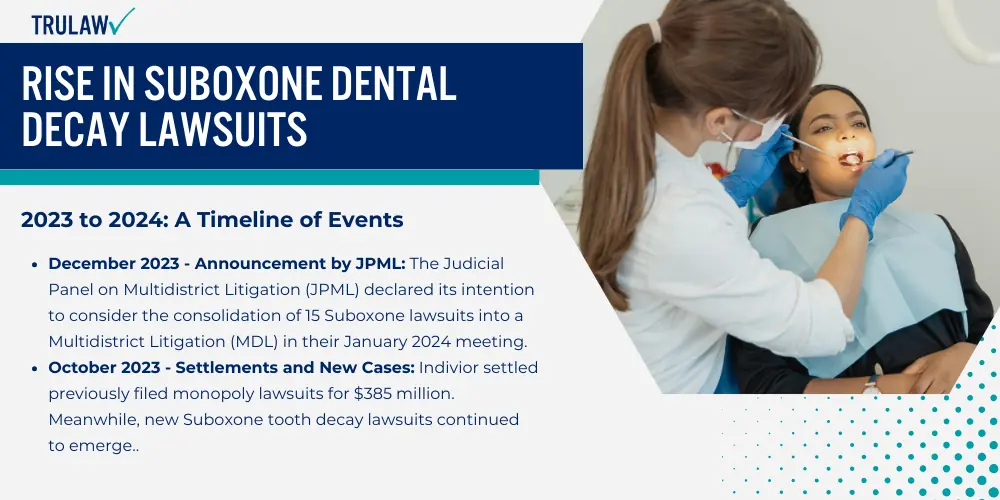
Allegations Against Suboxone Manufacturers
Suboxone, containing buprenorphine, is a medication designed to mitigate opioid addiction’s grip.
Initially available as tablets, its later introduction as sublingual films has raised significant health concerns.
The film version’s acidic nature is implicated in severe dental issues, including tooth decay and loss.
Claims Against the Manufacturer:
People have brought Suboxone teeth lawsuits against Indivior, the manufacturer, alleging failure to provide adequate warnings about these dental risks.
The U.S. Food and Drug Administration (FDA) reported over 300 dental problem cases related to Suboxone, leading to a tooth decay warning being added to the drug’s information in early 2022.
Key Developments in Suboxone Lawsuits from 2023 to 2024
Growing Litigation: The legal landscape surrounding Suboxone is rapidly evolving, with significant milestones shaping these lawsuits.
2023 to 2024: A Timeline of Events
- December 2023 – Announcement by JPML: The Judicial Panel on Multidistrict Litigation (JPML) declared its intention to consider the consolidation of 15 Suboxone teeth lawsuits into a Multidistrict Litigation (MDL) in their January 2024 meeting. This move could centralize these cases for coordinated pretrial proceedings.
- October 2023 – Settlements and New Cases: Indivior settled previously filed monopoly lawsuits for $385 million. Meanwhile, new Suboxone tooth decay lawsuits continued to emerge.
- September 2023 – Increasing Lawsuits: Another lawsuit was filed against Suboxone’s manufacturers for permanent dental damage caused by the drug.
- August 2023 – Federal Antitrust Settlement: Indivior agreed to a $30 million settlement in antitrust lawsuits filed by health plans.
- April 2023 – FTC Payout: The Federal Trade Commission completed the distribution of a $60 million class-action settlement to affected consumers.
- January 2022 – FDA Warning: The FDA mandated a new warning about dental problems on Suboxone’s prescribing information and patient medication guide.
No Public Settlements Yet
As of early 2024, no public settlements have been announced in Suboxone cases specifically related to dental problems.
However, past settlements have been reached concerning deceptive marketing claims.
Anticipated Increase in Lawsuits
The number of lawsuits is expected to grow, with many more likely to be filed across the federal court system.
These cases predominantly involve patients who have suffered dental injuries after being prescribed Suboxone, especially the sublingual film variant.
Important Factors in the Suboxone Teeth Lawsuit
The legal landscape surrounding Suboxone, particularly concerning dental decay lawsuits, is complex and multifaceted.
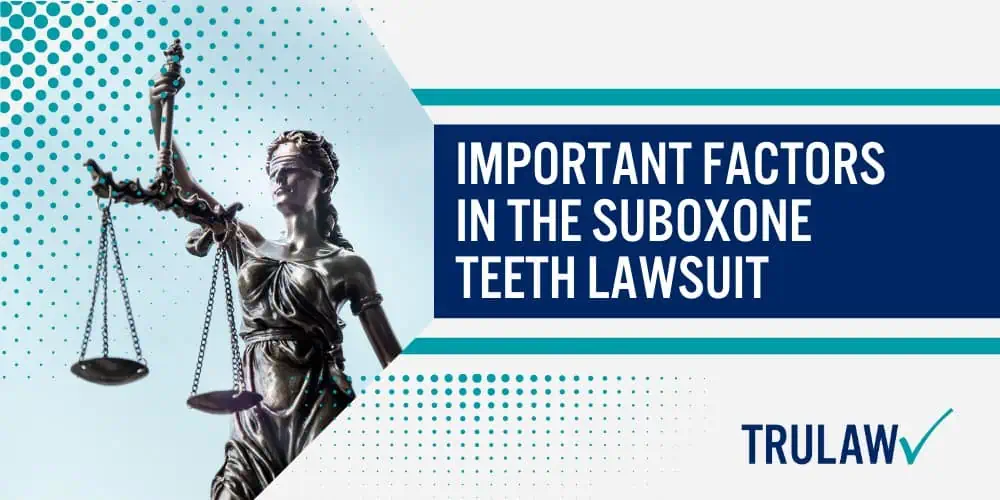
Individuals seeking to file a lawsuit against Suboxone must consider several critical factors.
Statute of Limitations for Suboxone Dental Decay Lawsuits
The statute of limitations is a crucial factor in any legal action, including Suboxone lawsuits.
This legal deadline determines the time frame within which a plaintiff can file a lawsuit.
In the context of Suboxone dental decay lawsuits, the statute of limitations varies by state.
Generally, it starts from the date when the plaintiff first becomes aware of the dental injury potentially linked to Suboxone use.
For individuals who have suffered severe tooth decay potentially linked to Suboxone, understanding this time frame is essential.
Missing this deadline can result in the loss of the right to seek legal remedy and compensation.
Therefore, it’s important for people filing Suboxone lawsuits to consult with legal professionals specializing in pharmaceutical litigation to ensure timely action.
The Role of Failure to Warn in Suboxone Lawsuits
A central argument in many Suboxone product liability lawsuits is the allegation of failure to warn.
Plaintiffs claim that the manufacturers of Suboxone, typically in the form of sublingual films or tablets, did not sufficiently inform users or prescribing physicians about the potential risk of dental injuries, including severe tooth decay.
In legal terms, failure to warn refers to the responsibility of manufacturers to inform consumers about the risks associated with their products.
In the case of Suboxone, this includes providing clear, comprehensive information about the potential dental side effects.
The outcome of many federal Suboxone lawsuits hinges on whether the court finds that the manufacturers adequately warned users about the risks of dental injuries linked to the use of physician-prescribed Suboxone film and tablets.
Identifying Potential Defendants in Suboxone Lawsuits
Identifying the correct defendants is a critical step in filing a Suboxone lawsuit.
Potential defendants in these cases typically include drug manufacturers, distributors, and sometimes healthcare providers.
In the United States District Court, where many of these cases are filed, plaintiffs must establish the connection between the defendants and the harm they suffered.
For Suboxone dental decay lawsuits, the manufacturers of Suboxone are often the primary defendants.
These companies are responsible for producing and marketing the drug, and if they fail to provide adequate warnings about the risk of dental injuries, they might be held liable in a court of law.
Additionally, in some cases, healthcare providers who prescribed Suboxone without adequately informing patients of the potential risks could also be included as defendants.
Potential Compensation in Suboxone Dental Decay Lawsuits
When pursuing a lawsuit related to dental injuries allegedly caused by Suboxone, understanding the potential compensation is a key concern for plaintiffs.
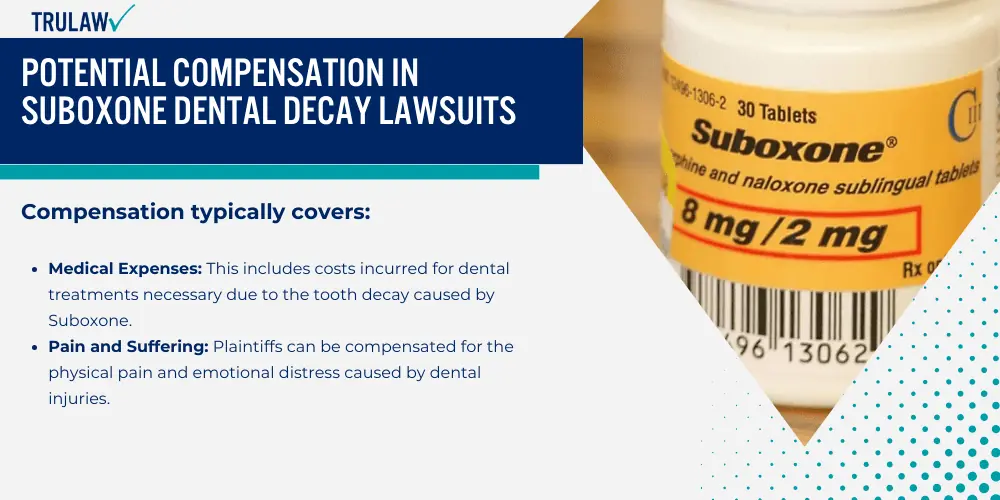
Estimating Settlement Payout Value for Suboxone Lawsuits
Determining the potential settlement value in a Suboxone dental decay lawsuit involves several factors.
These lawsuits primarily focus on the compensation for dental injuries linked to the use of Suboxone tablets or sublingual films, especially in cases where users suffer severe tooth decay.
The settlement value in Suboxone lawsuits is influenced by the severity and extent of the dental damage.
Compensation typically covers:
- Medical Expenses: This includes costs incurred for dental treatments necessary due to the tooth decay caused by Suboxone. It can range from simple cavity fillings to more extensive procedures like root canals, tooth extractions, and dental implants.
- Pain and Suffering: Plaintiffs can be compensated for the physical pain and emotional distress caused by dental injuries. Severe tooth decay and resulting treatments can be exceptionally painful and traumatic, justifying significant compensation in this category.
- Lost Wages: If the dental injuries and treatments have caused the plaintiff to miss work, compensation for lost wages can be claimed.
- Future Medical Costs: In cases where ongoing dental treatment is needed, future medical expenses are also considered in the settlement valuation.
Each Suboxone lawsuit is unique, and the compensation will vary depending on individual circumstances.
The complexity of these cases, especially when involving pharmaceuticals like Suboxone, necessitates detailed documentation and expert testimony to accurately estimate the settlement payout value.
Punitive Damages in Suboxone Lawsuits
Punitive damages in legal terms are not just compensatory but are intended to punish the defendant for particularly harmful behavior and to deter similar conduct in the future.
In Suboxone lawsuits, punitive damages could be sought if it is proven that the drug’s manufacturer knowingly concealed the risks of dental injuries associated with the drug or acted in a way that is considered grossly negligent or malicious.
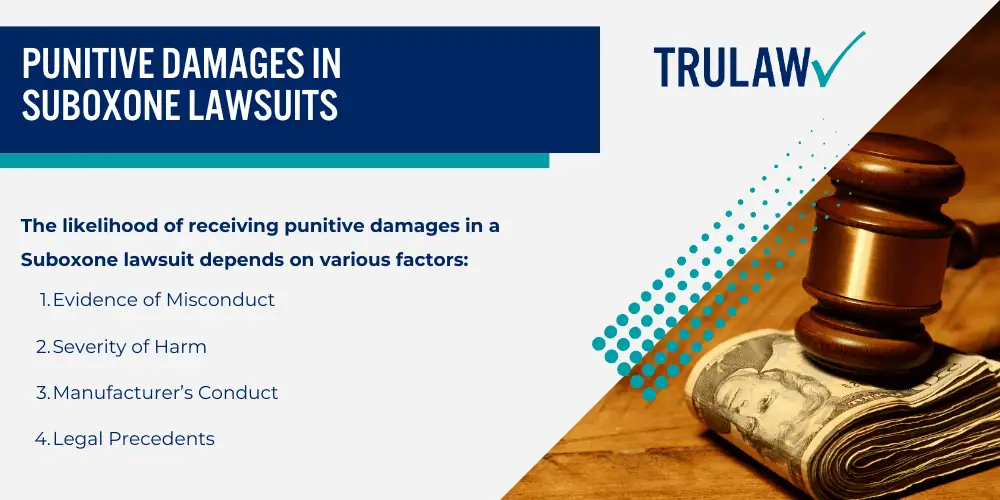
The likelihood of receiving punitive damages in a Suboxone lawsuit depends on various factors:
- Evidence of Misconduct: Clear and convincing evidence that the manufacturer of Suboxone was aware of the risk of severe tooth decay but failed to warn consumers and healthcare providers could lead to punitive damages.
- Severity of Harm: The extent of the dental injuries suffered by the plaintiff plays a role. Severe and extensive dental damage might justify a higher punitive award.
- Manufacturer’s Conduct: If it’s established that the manufacturer of Suboxone acted recklessly or egregiously regarding the safety of their product, punitive damages become more likely.
- Legal Precedents: Previous cases and verdicts against pharmaceutical companies for similar misconduct can influence the decision on punitive damages.
It is important to note that punitive damages are not awarded in every case and are subject to the discretion of the court.
They are more the exception than the rule in pharmaceutical litigation.
The Process of Joining a Suboxone Teeth Lawsuit
Joining a Suboxone teeth lawsuit involves a series of steps, each critical in ensuring that individuals who have suffered dental issues potentially linked to the use of Suboxone get their fair chance at legal recourse.
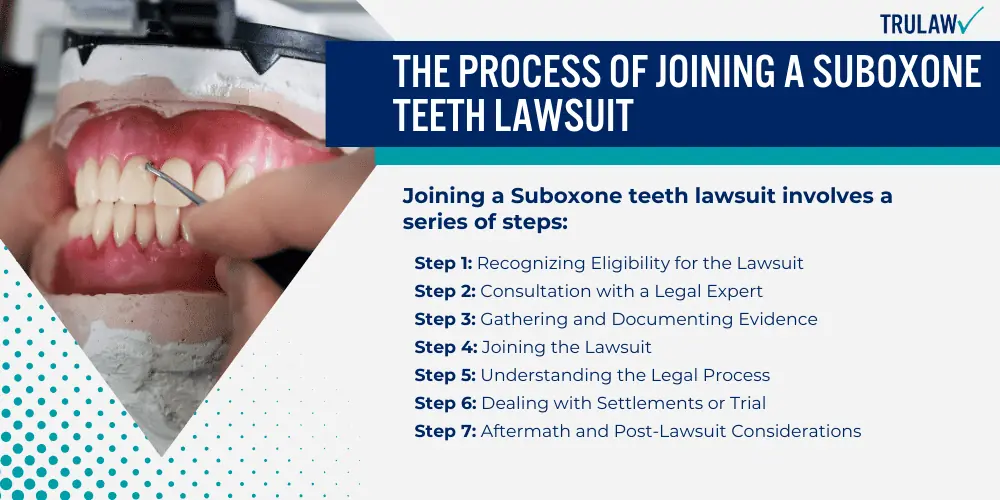
Step 1: Recognizing Eligibility for the Lawsuit
The first step in joining a Suboxone teeth lawsuit is to determine if you are eligible.
Eligibility criteria typically include having been prescribed Suboxone and subsequently suffering from significant dental issues.
Documentation of your medical history and dental records will be crucial in this phase.
Step 2: Consultation with a Legal Expert
After determining potential eligibility, the next step is to consult with a legal expert, preferably one with experience in pharmaceutical litigation.
During this consultation, you will discuss your case, and the lawyer will assess the strength of your claim.
This is a crucial step, as it will determine the feasibility of your lawsuit.
Step 3: Gathering and Documenting Evidence
If your case is deemed viable, the next step involves gathering and documenting evidence.
This includes medical records, dental records, prescription information, and any other relevant documents that can support your claim that Suboxone caused your dental issues.
Step 4: Joining the Lawsuit
Once your evidence is in order, your lawyer will guide you through the process of joining the lawsuit.
This could be a class-action lawsuit or an individual lawsuit, depending on the circumstances.
In a class-action lawsuit, you will join other plaintiffs who have suffered similar damages, while an individual lawsuit would be specific to your case alone.
Step 5: Understanding the Legal Process
Lawsuits, especially against pharmaceutical companies, can be lengthy and complex.
They may involve several stages, including discovery (exchange of relevant information between the parties), pre-trial motions, suboxone settlement negotiations, and possibly a trial.
Your attorney will navigate you through these steps and keep you informed at each stage.
Step 6: Dealing with Settlements or Trial
Many lawsuits end in settlements, where the defendant offers compensation without admitting guilt.
If your case goes to trial, be prepared for a more extended and possibly public process.
Your lawyer will prepare and present your case, aiming to prove that Suboxone caused your dental issues and that the manufacturer should be held liable.
Step 7: Aftermath and Post-Lawsuit Considerations
After the lawsuit concludes, whether through settlement or trial, there will be post-lawsuit considerations.
These may include how to manage the compensation received and understanding any tax implications.
It’s also important to continue managing your dental health and seeking appropriate treatments.
Joining a Suboxone teeth lawsuit requires understanding the connection between the medication and dental issues, determining eligibility, consulting with a legal expert, gathering evidence, and navigating the legal process.
It’s a journey that demands patience and resilience but can potentially lead to compensation and a sense of justice for the harm suffered.
Always remember that legal advice and guidance from experienced professionals are invaluable in such complex legal matters.
The #1 Suboxone Lawyer: TruLaw
TruLaw is a leader in litigating these cases, offering unmatched expertise in personal injury representation.
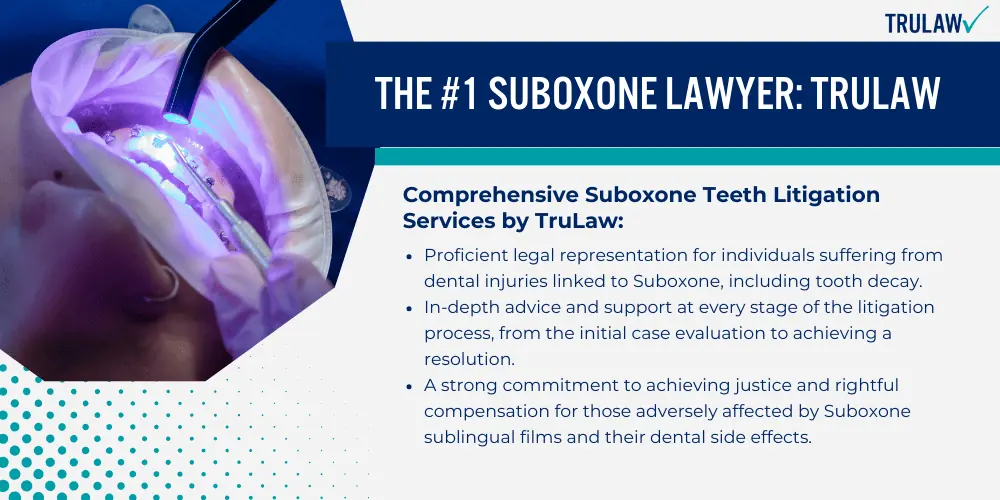
Our extensive network of legal professionals excels in pharmaceutical litigations to protect your rights against various large corporations.
If you or a loved one suffered severe tooth decay, worsening dental health, or dental injuries after taking Suboxone, you may be eligible to file in the Suboxone Teeth Lawsuit.
Use the chatbot on this page for a free and instant case evaluation to find out if you qualify to join others filing Suboxone Tooth Decay Lawsuits.

Managing Attorney & Owner
With over 25 years of legal experience, Jessica Paluch-Hoerman is an Illinois lawyer, a CPA, and a mother of three. She spent the first decade of her career working as an international tax attorney at Deloitte.
In 2009, Jessie co-founded her own law firm with her husband – which has scaled to over 30 employees since its conception.
In 2016, Jessie founded TruLaw, which allows her to collaborate with attorneys and legal experts across the United States on a daily basis. This hypervaluable network of experts is what enables her to share the most reliable, accurate, and up-to-date legal information with our readers!
Additional Suboxone Lawsuit resources on our website:
Here, at TruLaw, we’re committed to helping victims get the justice they deserve.
Alongside our partner law firms, we have successfully collected over $3 Billion in verdicts and settlements on behalf of injured individuals.
Would you like our help?
At TruLaw, we fiercely combat corporations that endanger individuals’ well-being. If you’ve suffered injuries and believe these well-funded entities should be held accountable, we’re here for you.
With TruLaw, you gain access to successful and seasoned lawyers who maximize your chances of success. Our lawyers invest in you—they do not receive a dime until your lawsuit reaches a successful resolution!
AFFF Lawsuit claims are being filed against manufacturers of aqueous film-forming foam (AFFF), commonly used in firefighting.
Claims allege that companies such as 3M, DuPont, and Tyco Fire Products failed to adequately warn users about the potential dangers of AFFF exposure — including increased risks of various cancers and diseases.
Depo Provera Lawsuit claims are being filed by individuals who allege they developed meningioma (a type of brain tumor) after receiving Depo-Provera birth control injections.
A 2024 study found that women using Depo-Provera for at least 1 year are five times more likely to develop meningioma brain tumors compared to those not using the drug.
Suboxone Tooth Decay Lawsuit claims are being filed against Indivior, the manufacturer of Suboxone, a medication used to treat opioid addiction.
Claims allege that Indivior failed to adequately warn users about the potential dangers of severe tooth decay and dental injuries associated with Suboxone’s sublingual film version.
Social Media Harm Lawsuits are being filed against social media companies for allegedly causing mental health issues in children and teens.
Claims allege that companies like Meta, Google, ByteDance, and Snap designed addictive platforms that led to anxiety, depression, and other mental health issues without adequately warning users or parents.
Transvaginal Mesh Lawsuits are being filed against manufacturers of transvaginal mesh products used to treat pelvic organ prolapse (POP) and stress urinary incontinence (SUI).
Claims allege that companies like Ethicon, C.R. Bard, and Boston Scientific failed to adequately warn about potential dangers — including erosion, pain, and infection.
Bair Hugger Warming Blanket Lawsuits involve claims against 3M — alleging their surgical warming blankets caused severe infections and complications (particularly in hip and knee replacement surgeries).
Plaintiffs claim 3M failed to warn about potential risks — despite knowing about increased risk of deep joint infections since 2011.
Baby Formula NEC Lawsuit claims are being filed against manufacturers of cow’s milk-based baby formula products.
Claims allege that companies like Abbott Laboratories (Similac) and Mead Johnson & Company (Enfamil) failed to warn about the increased risk of necrotizing enterocolitis (NEC) in premature infants.
Here, at TruLaw, we’re committed to helping victims get the justice they deserve.
Alongside our partner law firms, we have successfully collected over $3 Billion in verdicts and settlements on behalf of injured individuals.
Would you like our help?
